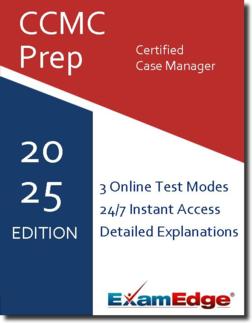CCMC Certified Case Manager (CCM) Practice Tests & Test Prep by Exam Edge - Topics
Based on 37 Reviews
- Real Exam Simulation: Timed questions and matching content build comfort for your CCMC Certified Case Manager test day.
- Instant, 24/7 Access: Web-based CCMC Certified Case Manager practice exams with no software needed.
- Clear Explanations: Step-by-step answers and explanations for your CCMC exam to strengthen understanding.
- Boosted Confidence: Reduces anxiety and improves test-taking skills to ace your CCMC Certified Case Manager (CCM).

Understanding the exact breakdown of the CCMC Certified Case Manager test will help you know what to expect and how to most effectively prepare. The CCMC Certified Case Manager has multiple-choice questions The exam will be broken down into the sections below:
| CCMC Certified Case Manager Exam Blueprint | ||
|---|---|---|
| Domain Name | % | Number of Questions |
| Psychosocial Aspects | 20% | 20 |
| Healthcare Reimbursement | 15% | 15 |
| Rehabilitation | 5% | 5 |
| Healthcare Management and Delivery | 20% | 20 |
| Principles of Practice | 15% | 15 |
| Case Management Concepts | 25% | 25 |


